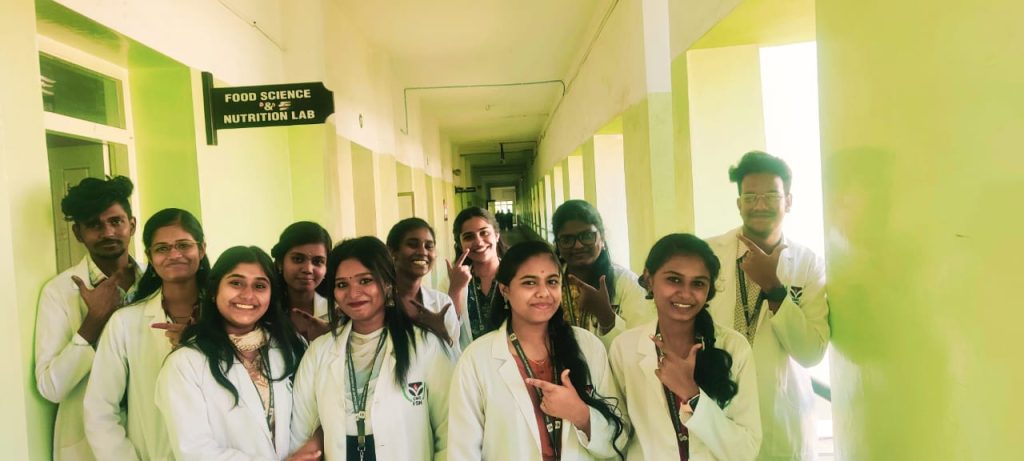- Examinations
- Admissions
- PCS
- IQAC
- Mandatory
- UGC 12-B
- ANNUAL REPORT 24-25
- ADMISSION GUIDELINES
- EXPENDITURE AND INCOME STATEMENT
- TELEPHONE DIRECTORY
- ICC
- GENDER EQUITY
- ANTI-RAGGING
- GRIEVANCE REDRESSAL CELL
- FOR DISABLED LIFT AND RAMP FACILITY
- ADMISSION REFUND POLICY
- AISHIE
- EXTERNAL AUDIT REPORT
- ACADEMIC CALENDAR
- WEEK
- CODE OF CONDUCT
- PROGRAMME OUTCOME
- INSTITUTIONAL PERSPECTIVE PLAN
- STATUTORY BODIES
- Cells and Clubs
- Public Self Disclosure
- RTI Act
- NIRF

B.Sc. Food Science & Nutrition
Program Overview
Understand and appreciate the role of interdisciplinary sciences in the development and well being of individuals, families and communities. Thinking Skills: Ability to critically think, analyze, evaluate and create new knowledge and skills both in the chosen discipline and across other fields like Food Processing and Preservation, Food Packaging, Community nutrition. The students learn biochemistry and chemistry as allied subject which will teach them to analyze the various nutrients in food and also to interpret the result of biochemical tests of blood and excretory system. This also forms the basics of further research for students pursuing a career as a food Scientist. The students are trained to be effective communicators by giving them communication training and personality development programs.
Career Opportunities
- Food inspector
- Quality Assurance officer
- Food product developer
- Nutrition consultant
- Registered Dietitian
- Market Research Analyst
- Food Microbiologist
- Community Nutrition Educator
- Food Chemist
- Testers and Graders
Programme USPs
- Based on Food Safety Officer and Registered Dietitian exams
Programme Outcomes
- PO1 Academic Excellence: Develop Professional skills in food, nutrition, textiles, product making and human development. Scientific Knowledge- Utilize knowledge from the physical and biological sciences as a basis for understanding the role of food and nutrients in health and disease process
- PO2 Understand: Understand and appreciate the role of interdisciplinary sciences in the development and well-being of individuals, families and communities. Thinking Skills: Ability to critically think, analyze, evaluate and create new knowledge and skills both in the chosen discipline and across other fields like Food Processing and Preservation, Food Packaging, Community nutrition
- PO3 Communicative Skills: Communicative effectively on Food Science & Technology activities with society at large and able to write effective reports and documentation and also to participate in public discourse on varied themes.
- PO4 Civic and Social Responsibility: Ability to function as a matured democratic citizen as a dietitian to formulate their own personalized product, As a public educator and also as a freelancer. The programme provides basic understanding of the correlation between food and health and also understanding the role of food under specific diseased conditions
Programme Duration
3 YEARS (6 SEMESTERS)
Programme Type : Regula
Eligibility Criteria
HSC (10, +2 Pattern) passed with Chemistry and any other subject or preference may be given to Vocational Courses: Home Science, Child Development, Nutrition, and Dietetics.
Programme Structure
SEMESTER I
- Core Course I: Food Science
- Core Course II: Food Chemistry
- Core Practical I: Food Science
- Allied Course I: Chemistry
SEMESTER III
- Core Course VI: Dietetics
- Core Course VII: Medical Nutrition Therapy
- Allied Course II: Biochemistry
- Elective I: Artificial Intelligence in Food Science & Nutrition
- Skill Based Course (SBC) I: Basics of Computer Science in Nutrition
- Module I – Course II – Holistic Nutrition in alternative medicine – Naturopathy and Nutrition
SEMESTER V
- Core Course IX: Food Microbiology
- Core Course X: Food Service Management
- Core Course XI: Community Nutrition
- Core Practical III: Family Meal Management
- Core Practical IV: Nutrition Practical
- Elective III: Nutrition in Food Safety
- Skill Based Course (SBC) III: Functional Foods and Neutraceuticals
- Internship: Dietary Internship
- Module II – Course II – Holistic Nutrition in alternative medicine – Ayurveda And Nutrition – I
SEMESTER II
- Core Course III: Human Physiology
- Core Course IV: Principles of Nutrition
- Core Course V: Nutrition in Health
- Allied Practical I: Chemistry Practical
- Module I – Course I – Holistic Nutrition in alternative medicine – Therapeutic Foods
SEMESTER IV
- Core Course VIII – Experimental Food Science
- Core Practical II: Dietetics
- Allied Practical II: Biochemistry Practical
- Elective II: Psychiatric Nutrition
- Skill Based Course (SBC) II: Health and Fitness
- Internship: Food Industry Internship
- Module II – Course I – Holistic Nutrition in alternative medicine – Yoga and Nutrition
SEMESTER VI
- Core Course XII: Food Processing and Preservation
- Core Course XIII: Post-Harvest Technology
- Core Course XIV: Food Quality Control & Food Laws
- Core Practical V: Food Processing and Preservation
- Elective IV: Nutrition in Weight Management
- Skill Based Course (SBC) IV: Baking Technology
- Module II – Course III – Holistic Nutrition in alternative medicine – Ayurveda And Nutrition – II
Value Added Program Offered
- Food Safety Supervisor Training Level 2
- Food processing
- Value added food product development
- Life style and wellness management
Credits & Evaluation
- Internal Assessment-2
- Model Examination-1
- End Semester Examination

